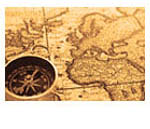| | |
-
authors: Tamayo-Velázquez MI, Simón-Lorda P, Loureiro JC, Ruiz D. last update: 13/09/2010
| | | | 1 | 

|
Portugal, officially the Portuguese Republic, is a country located in southwestern Europe on the Iberian Peninsula. Portugal is the westernmost country of Europe and is bordered by the Atlantic Ocean to the west and south and by Spain to the north and east. The Atlantic archipelagos of the Azores and Madeira are also part of Portugal.
Portugal is a developed country and it has the world's 19th-highest quality-of-life, according to The Economist Intelligence Unit.
It is the 13th-most peaceful and the 8th-most globalized country in the world.
It is a member of the European Union (joined the then EEC in 1986, leaving the EFTA where it was a founding member in 1960) and the United Nations; as well as a founding member of the Latin Union, the Organization of Ibero-American States.
Portugal had 10,617,575 inhabitants of whom about 332,137 were legal immigrants.
|
| 
| | | 2 | 

|
In Portugal there is no specific regulation concerning advance directive but their are covered by commons laws.
The Associação Portuguesa de Bioética has presented a proyect to legalize AD definitively.
Some used terms in Portugal to design AD are:
- directivas, decisões, disposições, directrizes antecipadas or prévias
- directivas antecipadas de vontade
- testamentos de paciente
- procurador de saúde
Current civil law allows any adult to sign a decision directives. Of course, only competent persons may sign an advance decision. Whether contracting capacity is required, or whether competence to consent is enough, is a matter of dispute .
|
| 
| | | 3 | 

|
In Portugal there is no specific regulation concerning advance directives. Nevertheless, this absence of a particular statute should not be understood as total silence from the legal system. Advance directives are covered indirectly by the following rules:
- The 1976 Portuguese Constitution defends seriously authonomy and recognizes the dignity of the human person as the fundamental principle of the juridical system.
- The Convention on Human Rights and Biomedicine that came into force on December 2001 and sets in article 9 the obligation to respect "“the previously expressed wishes relating to a medical intervention by a patient who is not, at the time of the intervention, in a state to express his or her wishes"
- The the Portuguese civil law does not forbid in any way decision directives
In 2006, the Associação Portuguesa de Bioética (http://www.apbioetica.org/) presented a project on advance directives (Directivas antecipadas de vontade) and on the establishment of the Advance Directives National Registry (RENDAV – Registo Nacional de Directivas Antecipadas de Vontade). In 2009 this institution passed a new version of the Project on advance directives.
- 2006. PROJECTO DE DIPLOMA N.º P/06/APB/06 Que regula o exercício do direito a formular directivas antecipadas de vontade no âmbito da prestação de cuidados de saúde e cria o correspondente registo nacional.
- 2009. PROJECTO DE DIPLOMA N.º P/16/APB/09 Que regula o exercício do direito a formular directivas antecipadas de vontade no âmbito da prestação de cuidados de saúde e cria o correspondente registo nacional.
In 2009 the Bill on Patients Rights to Information and Informed Consent presented by the Socialist Party is worth noting:
This bill includes some articles aimed to regulate the issue (Project n. 788/X, Section IV – art. 14-19). Although it was approved in first reading (aprovada na generalidade), the legislative procedure was to expired as a result of the end of the legislative term and the holding of new elections. It is expected to be reproposed soon, probably with some amendments.
|
| 
| | | 4 | 

|
Although there is no yet a law that fits this practice, the preparation of living wills is already a reality in the country. Advance directives are developed and accepted "informally". They are recorded in the notary and accepted by physicians but just do not have legal force.Many portuguese have left writing their desire not to be subjected to unnecessary treatments to prolong life artificially when, in a terminal phase, are not conscious to manifest his or her will. And these claims have been accepted by physicians.Since there is no record it is no possible to know the number of AD made in the Portugal.
|
| 
| | | 5 |


|
Required forms
There is not a required form.
The Portuguese Association of Bioethics suggests a form for AD:
|
| 
| | | 6 |

-
Proposal of the Portuguese Association of Bioethics on AD
-
According to the draft presented by the Portuguese Association of Bioethics:
- A document of advance directives may be done by everyone who enjoy full capacity to exercise rights and are capable of giving consent seriously, free and clear for the practice of health care.
- To implement the advance directive the document must be signed in the presence of:
- • a notary;
- • an employee of RENDAV, competent to do so according to its Rules of Organization and Functioning;
- It is necessary indicate a complete and proven identification and signature of the grantor; the place, date and time of signature.
- The Advance directive will be delivered in the health care facility by the grantor or by the RENDAV if it has been registered.
- The advance directives document will be valid for a period of three years from the date of signature.
- The author of an AD has the right to modify or revoke, at any time freely, in whole or in part the document.
| 
| | | 7 |


|
More information about AD in Prtugal can befound at the following links:
|
Research projects -
Publications
Books
- Pereira A. Advance directives: binding or merely indicative? Incoherence of the Portuguese National Council of Ethics for the Life Sciences and insufficiencies of newly proposed regulation. Eur J Health Law. 2009Jun;16(2):165-71.
- Gonçalves JA. Attitudes toward end-of-life situations other than euthanasia and assistedsuicide among Portuguese oncologists. Support Care Cancer. 2009Oct 6.
- Loureiro JC. Advance Directives: A Portuguese Approach. Lex Medicinae - Revista Portuguesa de Direito da Saúde - Ano 5 • n.º 9 • 2008. Pg. 5-14.
Links
Other resources
| 
| | | 8 | Not available | 
| | | 9 | | 
| | | 10 | | 
| |
|